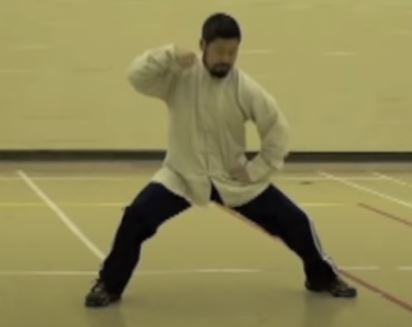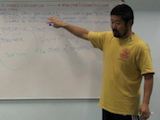Already some time ago now I had an interesting discussion with another person from Germany. There was one aspect showing up, which in principle could be very interessting for all of us who want to learn Taiji.
Here and there Master Chen did point out that in Taijiquan (or at least our style of Taijiquan ..) there is nothing which is related to anything we know from normal life, to the contrary, in general things are totally opposite. Right?
Further he did point out that we cannot hear or understand what he is saying and cannot see the right move, because our mind always cheats us and we can only see what we like to see. So far as I could hear and understand him …
So the problem is already here, I also have my personal filters and cannot see things like they are, according to this …
This also goes pretty well along with the Buddhist teachings, as I know them.
Now here´s my little story:
We had a discussion about a sound in Chinese language. I have to say that I´m really not an advanced speaker in Chinese, but as a musician I really love sounds, especially the little suttle differences in particular sounds. That´s one of the reasons why I love Chinese with it´s tones.
One difference between me and the person we had the following discussion is that I did start to learn some mandarin some while ago and I went through a certain procedure quite a few times:
Learning some words and sentences with a book and audio recordings, then try to use them with Chinese people, they did not understand a word but finally corrected me, I practiced again a bit and only after that I was able to use these few things in daily live, and now sometimes Chinese people think I pronounce quite well.
So me and the other German person were listening to a recording of some Mandarin, spoken by a Chinese voice. The word “ri4 – 日” like “xing1qi1ri4 – 星期日”.
This sound might be a bit similar to our german “ü”, but actually it is totally different. Also the movement of the tounge is very different. Then a real discussion did arise, because this other person constanly heard only this “ü” – repetetively. And more than that, she was absolutely sure that she is right.
You probably had similar experiences, usually it is always like that when someone tries to copy a foreign language at the beginning. For me what is really interessting here is how strong we marginalise everything we don´t know and how blind (or thumb) we can become by doing this. In daily life, I´m quite sure, it must happen all the time without us knowing it!
For learning Taiji probably even worse, but perhaps also more easy, because more clear, as we want to revese everthing to the opposite. So this becomes somehow a major principle.
Back to Mandarin I personally think it is a good idea for total beginners, NOT to read pinyin in the very beginning, instead it might be better just to listen to the language and it´s sounds first, then copy them, still WITHOUT looking at the pinyin. The pinyin will only mislead you, because the sounds are different from those we use to express with our alphabet (for German probably even more different than for English).
Then for learning in general I think, it might be quite important to learn to be confortable to be in the dark, and to try to get into a “receaving only mode”, at best without any pressure and preset expectations.
Or to put it in simple words: first watch/listen, then just copy, without analysing and questioning the subject. Just like the first two steps in learning according Master Chen and his Master’s method, right?
I think, that in the example above we can see pretty clear how we are not able to “just listen” and then “just copy”.
The other day, by the way, we did play the recorded “ri4 – 日” on the table, one Chinese person and the rest western people. Everybody did suggest to hear something totally different, only the Chinese person did hear it right
I’m sorry now for not beeing able to express that little story with fewer words, but actually for me there did show up how drastic this issuevis in general.
What do you think?
Please use this website to discuss, if possible. I don´t use fb, especially now we are in China the access is quite limited.
All best wishes from the mountain,
Michael




{ 11 comments… read them below or add one }
I love this story. Thank you.
Language immersion; Practical Method immersion.
That is a great story and lesson Michael, thank you so much.
—
“how strong we marginalise everything we don´t know”
—
The above is such an important point. As you say, we must learn in the dark.
Thanks for the reply, Hugo.
One thing you wrote I beg to differ, I actually don´t want to say that “we must learn in the dark”. Actually I think dark is dark and light is light, and learning probably is to bring light into the dark.
I think the very difficult and challenging part here is that we are in the dark without knowing it, and we need to get out of there, which would mean to learn.
Further we can consider that we cannot be aware of our own filters, so how can we know when we start to see things like they really are? Isn´t it logical to say that this is liteally impossible?
As long as we are in the dark I woud say we are probably not learning. At least technically. This is really challenging, right?
I believe the above especially applys to things which are totally new for us. So very interesting, the child does not have this problem, because for the new born everything is quite new, so nothing to connect, just pure observation and copy – actually simple …
Thanks for clarifying Michael! I can see that you wrote something different to my re-statement now. I don’t actually know what learning is, however I can say that your story has helped me somehow!
Hi Hugo,
your reply keept me thinking on the topic. Since we become aware of the matter, that we have personal filters in perception (as especially you did point out very nicely and clearly on your introduction to Chinese Medicine in Berlin, btw), it gets very tricky to make any statements at all, right?
So I questioned the whole thing again, my conclusion at the moment is: probably it is not that difficult to define “learning”, but much more difficult to find out if oneself is keep going learning.
The other day a had a little experience and feedback from Master Chen doing pushhands together, and a quite simple answer came to my mind, actually it was remembering what was tought earlier: use a point of reference! And technically best or a even only suitable is a non moving one.
So for doing single exercises in our system quite simple, but what about the whole learning process? I made the experience here and there that I was kind of surprised by the training effect of Yilu when doing pushhands or similar “games”, especially with people not doing our Taiji or even not doing any martial art training, which makes them kind of a “non moving reference point” for us. There I realised mainly how much Yili I was training the time before, and though it was a surprising effect it was also quite clear to me that it came from doing Yilu. Yilu mainly was the only training I did over the last years, so that should be a quite clear conclusion.
Coming back to the original topic: I think these little stories from our daily life can help us to simply accept the matter of a fact that we are in the dark so often. This way we can become a bit easy on that, then it is not necessary to marginalise this fact that much and then we can start to learn, or come back to learning as we probably did in the very beginning.
I think one should also read this article from Master Chen on that:
http://practicalmethod.com/2012/03/how-do-you-know-whether-you-are-learning/
Michael,
Its true, we learn in terms of what we already know. As Practical Method Taijiquan is not like anything we know from normal life, it can be difficult to learn. However this also makes Taijiquan very exciting, a large part of its attraction is in its mystery.
As someone not far into their Taiji journey, I can relate to your story in terms of using my body weight to create momentum or force in my Taiji moves. To make the change so that parts of my body rotate away from the direction of my force has been difficult. Other body parts aren’t to move at all. My habit of using body weight is very entrenched. I still can’t perform the Taiji moves properly and resort to throwing my body into each push and pull.
But I have more understanding now. It took a while though, and I am guilty of not ‘hearing’ Master Chens explanations. I didn’t place value on some of the things he said in his videos simply because I couldn’t relate. I was looking hard for explanations in terms of what I already knew. Namely momentum. Looking back what kept me going in the beginning were Master Chens demonstrations. I could see things happening.
After some time, and with a lot of help and patience from Paul Janssens the path is somewhat clearer. Now I regularly make small but important discoveries, putting Master Chens explanations into new light. For me the journey is compelling and a lot of fun.
Nick
Hi Nick,
Thanks for your reply, and all best for your further Taiji-Journey!
As you said that you are quite new to the system I just want to encourage you to get prepared. In the beginning usually it is more easy, learning is more clear as everything is new, but later on very likely it will get more challenging. Prepare to “eat bitter”, as this old chinese saying goes.
And please send my best wishes to Paul, I met him on the mountain in 2010 and have not seen him since then! Thanks.
Michael, are you still in the dark or is there light? What about your family? Are your sons every going to achieve Taiji? And if not, what do you wish for them in the lifes? What is really important for a Daoist?
What do i read on your website:
“All classes are offered under “Divine Arts”, an Auroville Activity under the LEAD umbrella. With your contribution you are also supporting the International Township of Auroville.”
I see, you know the real deal. And you teach to bring the people out of their dark life into the light.
They call it divine arts. Well, do you believe in God? If so, then you accept the claim that God is almighty. If he is, then all the things you criticize on your website regarding society, economy, politics, etc. is God`s will, since he is almighty. So, do you think, that you and the people in this community, you know better than God?
https://auroville.org/page/online-store
What do you mean by “contribution”? Let me guess, ahhh, money for the growing economy of Auroville!!! You need money, too. And money is support. Great insight! The all-seeing eye on the one dollar bill says “thank you”. In God we trust.